人教版八年级下册英语重点语法知识全汇总
初二英语下册知识点归纳人教版
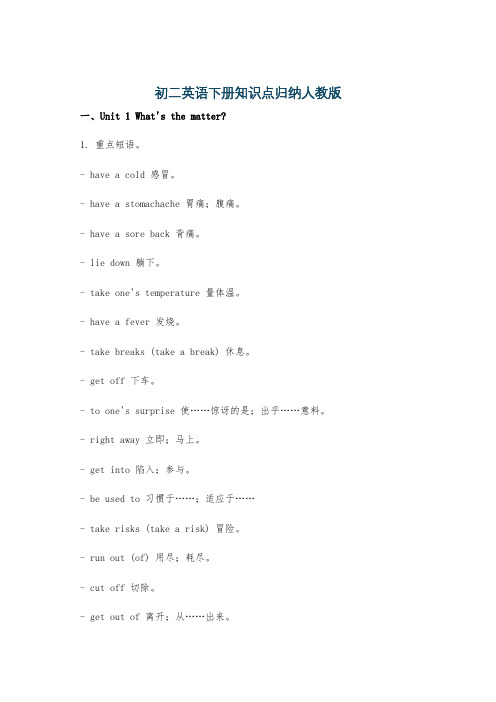
初二英语下册知识点归纳人教版一、Unit 1 What's the matter?1. 重点短语。
- have a cold 感冒。
- have a stomachache 胃痛;腹痛。
- have a sore back 背痛。
- lie down 躺下。
- take one's temperature 量体温。
- have a fever 发烧。
- take breaks (take a break) 休息。
- get off 下车。
- to one's surprise 使……惊讶的是;出乎……意料。
- right away 立即;马上。
- get into 陷入;参与。
- be used to 习惯于……;适应于……- take risks (take a risk) 冒险。
- run out (of) 用尽;耗尽。
- cut off 切除。
- get out of 离开;从……出来。
- be in control of 掌管;管理。
2. 重点句型。
- What's the matter? = What's wrong? = What's the trouble? 怎么了?- Should I put some medicine on it? 我应该在它(伤口)上敷些药吗?- You should lie down and rest. 你应该躺下休息。
- He hurt himself in P.E. class. 他在体育课上伤到了自己。
- Aron Ralston is an American man who is interested in mountain climbing. 阿伦·罗尔斯顿是一个对登山感兴趣的美国人。
3. 语法。
- 情态动词should的用法:should表示“应该”,用来提出建议或劝告,后接动词原形。
例如:You should see a dentist. 否定形式为shouldn't,例如:You shouldn't go to school late.二、Unit 2 I'll help to clean up the city parks.1. 重点短语。
人教版初中英语八年级下册全册各单元知识点、语法归纳整理
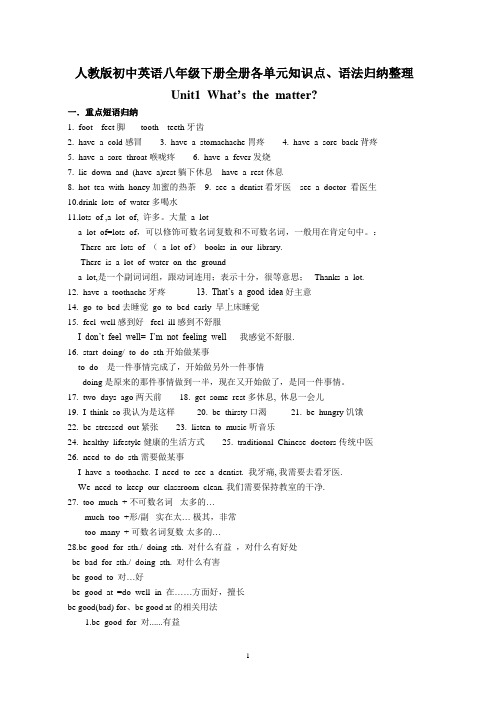
人教版初中英语八年级下册全册各单元知识点、语法归纳整理Unit1 W hat’s the matter?一.重点短语归纳1. foot---feet 脚tooth---teeth 牙齿2. have a cold 感冒3. have a stomachache 胃疼4. have a sore back背疼5. have a sore throat喉咙疼6. have a fever发烧7. lie down and (have a)rest 躺下休息have a rest 休息8. hot tea with honey 加蜜的热茶9. see a dentist 看牙医see a doctor 看医生10.drink lots of water多喝水11.lots of ,a lot of, 许多。
大量a lota lot of=lots of,可以修饰可数名词复数和不可数名词,一般用在肯定句中。
:There are lots of (a lot of)books in our library.There is a lot of water on the grounda lot,是一个副词词组,跟动词连用;表示十分,很等意思;Thanks a lot.12. have a toothache牙疼13. That’s a good idea好主意14. go to bed 去睡觉go to bed early 早上床睡觉15. feel well感到好 feel ill 感到不舒服I don’t feel well= I’m not feeling well我感觉不舒服.16. start doing/ to do sth开始做某事to do 是一件事情完成了,开始做另外一件事情doing是原来的那件事情做到一半,现在又开始做了,是同一件事情。
17. two days ago两天前18. get some rest 多休息, 休息一会儿19. I think so我认为是这样20. be thirsty口渴21. be hungry 饥饿22. be stressed out紧张23. listen to music听音乐24. healthy lifestyle健康的生活方式25. traditional Chinese doctors传统中医26. need to do sth 需要做某事I have a toothache. I need to see a dentist. 我牙痛, 我需要去看牙医.We need to keep our classroom clean. 我们需要保持教室的干净.27. too much + 不可数名词太多的…much too +形/副实在太…极其,非常too many + 可数名词复数太多的…28.be good for sth./ doing sth. 对什么有益,对什么有好处be bad for sth./ doing sth. 对什么有害be good to 对…好be good at =do well in 在……方面好,擅长be good(bad) for、be good at的相关用法1.be good for 对......有益Doing morning exercises is good for your health.做早操对你们的建康有益。
英语八下人教版重点语法

英语八下人教版重点语法
英语八下人教版的重点语法包括:
1.过去完成时(Past Perfect Tense):用来表示在过去某个时间或动作之前已经发生或完成的动作。
例如:I had already
finished my homework before my mom came back.
2.时间状语从句(Time clauses):用来表示时间关系的从句,一般以when,as soon as,until,before,after等引导。
例如:We will go to the park when it stops raining.
3.条件状语从句(Conditional clauses):用来表示假设条件的从句,一般以if引导。
例如:If it rains tomorrow, we will stay at home.
4.动词不定式(Infinitives):用来表示目的、原因、建议等。
例如:I went to the store to buy some groceries.
5.被动语态(Passive voice):用来强调动作的承受者而不是执行者。
例如:The cake was made by my mom.
6.定语从句(Relative clauses):用来修饰名词或代词的从句,一般由关系代词who,which,that引导。
例如:The boy who won
the competition is my neighbor.
这些语法结构在英语八下人教版教材中经常出现,需要学生掌握
和应用。
希望以上回答能对您有帮助。
(完整版)人教版英语八年级下册重点词组、句型及语法点汇总,推荐文档
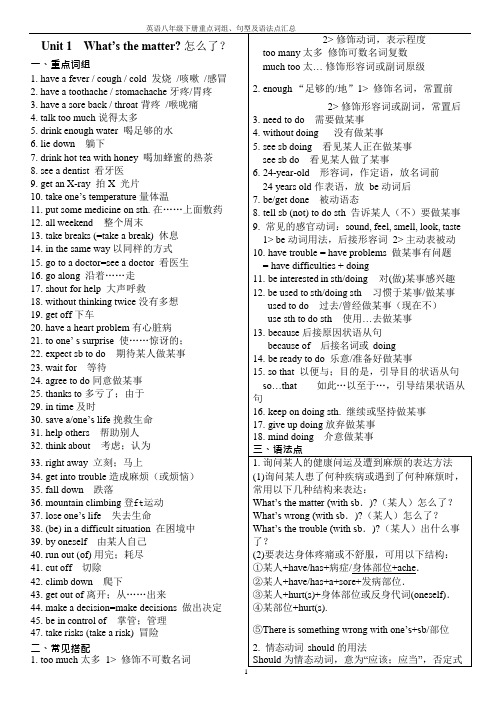
13.be back 回来14.be angry with sb 生某人的气15.throw down 扔下16.the minute=as soon as 一…就…e over 过来18.sit down 坐下19.take sb. for a walk 带某人去散步20.all the time 频繁;反复21.all day / evening 整日/夜22.shout back 大声回应23.walk away 走开24.in surprise 惊讶地25.share the housework 分担家务26.hang out 闲逛27.do chores 做杂务28.go to the store 去商店29.buy drinks and snacks 买饮料和点心30.make sb. do sth. 使某人做某事31.have enough stress from 有来自…足够的压力32.a waste of time 浪费时间33.in order to 为了34.get good grades 取得好成绩35.depend on 依赖;依靠36.have no idea 不知道37.develop children’s independence 发展孩子独立性38.look after=take care of 照顾;照看39.as a result 结果40.agree with sb 同意某人的观点/意见disagree with sb 不同意某人的观点/意见二、常见搭配1.finish doing sth. 完成做某事2.a few “几个”,后接可数名词复数few “很少,几乎没有”,后接可数名词复数a little “一点儿”,后接不可数名词little “很少,几乎没有”,后接不可数名词3.1> question “问题”,需要回答的问题,与ask或answer 搭配2> problem “问题”,需要解决的问题,与solve 搭配in the front of “在…前面”,在所说范围之内5.as…as… “与…一样…”,中间加形容词或副词原级,。
新版人教版八年级下英语语法重点归纳(全)

新版人教版八年级下英语语法重点归纳(全)一、名词名词是指用来表示人、事物、地方、动物等的名称的词语。
名词分为可数名词和不可数名词。
可数名词有单数和复数两种形式,而不可数名词只有单数形式。
- 可数名词:表示单数时,名词前面通常有冠词a/an或者其它数量词进行修饰;表示复数时,名词通常要在词尾加“s”。
- 不可数名词:不可数名词表示的是无法分为个体的物体、概念、抽象事物等,通常不能用于复数形式。
二、动词动词表示人或物的动作、行为、状态或存在的词语。
动词分为及物动词和不及物动词。
- 及物动词:及物动词后面可以直接接宾语,表示动作的承受者或影响对象。
- 不及物动词:不及物动词不能直接接宾语,它可以后面接副词或介词短语,表示动作发生的方式、状态等。
三、形容词形容词是用来描述名词性词语的词语。
它可以表示人或物的性质、状态、特征、颜色等。
- 形容词可以修饰名词,放在名词的前面。
- 形容词还可以通过加后缀“-er”和“-est”来比较级和最高级。
四、副词副词是用来修饰动词、形容词和其他副词的词语。
副词可以表示时间、地点、方式、程度、频率等。
- 副词在句中通常位于动词、形容词或者其他副词的前面。
- 副词的比较级和最高级可以通过在前面加上more和most来表示。
五、代词代词是用来代替名词或名词性的词语的词语。
代词可以分为人称代词、指示代词、疑问代词、不定代词等。
- 人称代词表示人的身份或人称,包括主格和宾格两种形式。
- 指示代词用来指示特定的人或物,可以表示近处的、远处的或已提到的事物。
- 疑问代词用于提问,通常用来询问人或事物的身份、性质、数量等信息。
- 不定代词用来指代不特定或泛指的人或物,表示数量或程度。
六、冠词冠词是位于名词前面用来修饰名词的词语。
冠词分为定冠词和不定冠词。
- 定冠词指特指某一具体的人或事物,有两种形式:定冠词“The”用于表示特定的人或物,而不定冠词“A/An”用于泛指任意的人或物。
七、介词介词是用来表示人或物之间关系的词语。
人教版八年级下册英语重点语法知识全汇总

人教版|八年级下册英语重点语法知识全汇总重点语法:一般将来时态的应用do/does 的一般将来时态形式:(shall/will) dodo/does 的一般将来时态的被动语态:(shall/will) be done 一般将来时态的肯定句、否定句、疑问句形式:肯定句例句:People will have robots in a few years. 否定句例句:People (will not/won't) have robots in a few years. 一般疑问句例句:Will people have robots in a few years? 特殊疑问句例句:What will people have in a few years?重点语法:过去将来时一、过去将来时的结构should/would+ 动词原形do/does 的过去将来时态形式:(should/would) do do/does 的过去将来时态的被动语态:(should/would) be done 过去将来时态的肯定句、否定句、疑问句形式:You should write a letter to him.肯定句例句:否定句例句:You shouldn't write a letter to him.一般疑问句例句:Should I write a letter to him?特殊疑问句例句:What should I do?重点语法:过去进行时do/does 的过去进行时态形式:(was/were) doingdo/does 的过去进行时态的被动语态:(was/were) being done 过去将来时态的肯定句、否定句和疑问句形式:I was walking down the street when a UFO landed.肯定句例句:否定句例句:I wasn't walking down the street when a UFO landed.一般疑问句例句:Were you walking down the street when a UFO landed?特殊疑问句例句:What were you doing when a UFO landed?动词when 和while 的选择:when 后加瞬间动词,while 后加延续性动词。
人教版八年级英语下册各知识点归纳总结(最新最全)

人教版八年级英语下册各知识点归纳总结Unti1 what’s the matter?短语归纳1.too much 太多2.lie down 躺下3.get an X-ray 做个X光检查4.take one ’s temperature 量体温5.put some medicine on ......在....上敷药6.have a fever 发烧7.take breaks /take a break 休息 8.without thinking twice 没多想9.get off 下车 10.take sb to the hospital 送某人去医院11.wait for等待 12.to one’s surprise 使.......惊讶的13.thanks to多亏于;由于 14.in time及时15.think about 考虑 16.have a heart problem患有心脏病用法归纳1.need to do sth .需要去做某事2.see sb doing sth 看见某人正在做某事3.ask sb sth 询问某人某事4.expect sb to do sth 期望某人做某事5.agree to do sth 同意做某事6.help sb (to) do sth 帮助某人做某事7.want to do sth 想要做某事 8.tell sb to do sth 告诉某人做某事9.have problems(in) doing sth 做某事有困难 e sth to do sth用某物去做某事语法点1.询问某人的健康问题及遇到麻烦的表达方法2.情态动词should的用法3.不定代词的用法精细解读1. What’s the matter (with you)? 怎么了?出什么事了?What’s the trouble/ the problem / wrong with sb./ sth.?2. I had a cold.我感冒了。
人教版八年级英语下册各单元知识点总结完整版

Unit 1 What’s the matter?一、重点短语1. have a fever 发烧2. have a cough 咳嗽3. have a toothache 牙疼4. talk too much 说得太多5. drink enough water 喝足够的水6. have a cold 受凉;感冒7. have a stomachache 胃疼8. have a sore back 背疼9. have a sore throat 喉咙痛10. lie down and rest躺下来休息11. hot tea with honey加蜂蜜的热茶12. see a dentist看牙医13. get an X-ray拍X光片14. take one’ s temperature量体温15. put some medicine on sth在……上面敷药16. feel very hot 感到很热17. sound like 听起来像18. all weekend 整个周末19. in the same way以同样的方式20. go to a doctor 看医生21. go along 沿着……走22. on the side of the road 在马路边23. shout for help 大声呼救24. without thinking twice 没有多想25. get off 下车26. have a heart problem 有心脏病27. to one’ s surprise 使……惊讶的28. thanks to 多亏了;由于29. in time及时30. save a life 挽救生命31. get into trouble 造成麻烦32. right away 立刻;马上33. because of 由于34. get out of 离开35. hurt oneself 受伤36. put a bandage on sth. 用绷带包扎37. fall down 摔倒38. feel sick 感到恶心39. have a nosebleed 流鼻血40. cut his knee割伤他的膝盖41. put her head back 把她的头向后仰42.have problems breathing呼吸困难43. mountain climbing登山运动44. be used to doing sth. 习惯做某事45. run out (of) 用完;用尽46. so that 以便47. so…that 如此……以至于……48. be in control of 掌管;管理49. in a difficult situation 在逆境屮50. keep on doing sth.坚持做某事51. make a decision做出决定52. take risks 冒险53. give up 放弃二、知识点解析1. What’s the matter? 怎么了?若是询问“某人怎么了?”要用“What’s the matter with sb.?”拓展:What’s the matter with sb.? 的同义句:What’s wrong with sb.? / What’s the trouble with sb.?2.疾病类短语:have a +疾病. e.g. :have a fever 发烧have a cold 感冒have a cough 咳嗽.have a +身体部位-ache. e.g.: have a headache 头痛have a toothache 牙痛.have a sore+身体部位. e.g.: have a sore throat咽喉痛have a sore back背痛例题:Mom, I____________.I’m sorry to hear that, dear. We must go to see the dentist right away.A. have a headacheB. have a stomachacheC. have a toothacheD. have a fever3. lie down 躺下V. 躺,平躺。
人教版英语八年级下册知识点

Unit 1 What’s the matter?一、重点短语1. have a fever 发烧2. have a cough 咳嗽3. have a toothache 牙疼4. have a sore back 背疼5. have a sore throat 喉咙痛6.have a cold 受凉;感冒7. have a nosebleed 流鼻血8.have a heart problem 有心脏病9.have a stomachache 胃疼10.have problems breathing 呼吸困难11. talk too much 说得太多12. drink enough water 喝足够的水13. lie down and rest 躺下来休息14. hot tea with honey 加蜂蜜的热茶15. see a dentist 看牙医16. get an X-ray 拍X 光片17. take one’s temperature 量体温18. feel very hot 感到很热19. go along 沿着……走20. go to a doctor 看医生21. get off/on 下车/上车22. get into trouble 造成麻烦23. get into/out of 进入/从……出来24. be in control (of) 掌管;管理25.be out of control(of)失控26. thanks to 多亏了27. on the side of the road 在马路边28. shout for help 大声呼救29. put some medicine on sth. 在…上面敷药30. all weekend 整个周末31.put a bandage on sth. 用绷带包扎32. hurt oneself 受伤33. to one’s surprise 使....... 惊讶的34.fall down 摔倒35. without thinking twice 没有多想36. save a life 挽救生命37. put her head back 把她的头向后仰38. cut his knee 割伤他的膝盖39. be used to doing sth. 习惯做某事40. used to do过去常常41. in the same way 以同样的方式42. sound like 听起来像43. make a decision 做出决定44. because of 由于45. mountain climbing 登山运动46. feel sick 感到恶心47. in a difficult situation 在困境中48. take risks 冒险49. keep on doing sth. 继续做某事50. give up (doing) sth. 放弃51. run out (of) 用完;用尽52. in time 及时on time准时53. right away/at once 立刻54. so that 以便二、重点语法1.What’s th e matter(with sb)?怎么了?询问麻烦事或身体状况=What’s the trouble (with sb)?=What’s the problem (with sb)?=What’s up?=What’s your trouble/problem?2.1.) have a+名词,表示某种病have a cough咳嗽2.)sore也可表疾病have a sore back/throat背疼/喉咙痛3. need有两种词性,实义动词和情态动词实义动词:1. need sth 2. need (sb) to do 3. don’t need.....情态动词:1. need+原型2. Need I ....? 肯Yes,you must. 否No, you needn’t.4.see sb do sth看见某人做某事(强调全过程)see sb doing sth看见某人正在做某事(强调正在发生)5.expect sth期待某物agree with sb同意某人expect(sb) to do 期待做某事agree to do同意做某事expect+that从句期待agree+that从句6.have trouble/problems in doing sth 做某事有困难7.trouble用法:1).be in trouble处于困境2).get(sb) into trouble(使某人)陷入困境8.词组辨析:used to do过去常常be used to doing习惯于做9.so...that+从句如此...以至于so that为了,目的是引导目的状语从句(当主句主语与从句主语一致时可用in order to)Eg: He works hard so that he can succeed=He works hard in order to succeed.10.What’s the meaning of...?=What does...mean?....的意思是什么?11.反身代词:myself, yourself, himself, herself, itself, ourselves, yourselves, themselvesteach oneself,enjoy oneself,dress oneself,introduce oneself,help oneself12.躺:lie-lay-lain-lying 说谎:lie-lied-lied-lying下蛋:lay-laid-laid-laying(规则的撒谎,不规则的躺,躺过就下蛋)Unit 2 I ’ll help to clean up the city parks.一、重点短语1. Clean-Up Day 清洁日2. an old people’s home 养老院3. help out with sth. 帮助解决困难4. used to do sth.过去常常做某事5. care for 关心;照顾6. the look of joy 快乐的表情7. at the age of 在......岁时8. clean up 打扫(或清除)干净9. cheer up (使)变得更高兴;振奋10. give out 分发;散发11. come up with 想出;提出12. make a plan 制订计划13. make some notices 做些公告牌14. try out 试用;试行15. work for 为…工作;为…. 效力16. put up 建造;举起;张贴17. hand out 分发;散发;发给18. call up 打电话;召集19. put off 推迟;延迟20. for example 比如;例如21. raise money 筹钱;募捐22. take after 与......相像;像23. give away 赠送;捐赠24. fix up 修理;修补;解决25. be similar to 与……相似26. set up 建立;设立27. disabled people 残疾人28. make a difference 影响;有作用29. be able to 能够30. after-school reading program课外阅读项目31.a feeling of satisfaction满足感32.several hours若干小时33.volunteer to do自愿做34.sick kids生病的孩子35.homeless people无家可归的人36.be busy with sth忙于37.disabled people残疾人38.a trained dog一只受过训的狗39.book lover爱书者40.think up想出二、重点语法1. notice sb do sth注意到某人做过某事,notice sb doing sth注意到某人正在做某事3.satisfaction用法:1.)satisfy v. satisfy sb 使某人满意2.)satisfied/satisfying adj. be satisfied with对...满意3.)satisfaction n. to one’s satisfaction令某人满意4.owner用法:1.)the owner of...的主人the owner of the shop 2.)one’s own+名词my own shop5. sick adj. 定语,表语sickness n.ill adj. 表语illness n. He is ill.=He is sick. Here is a sick dog.5.raise 及物动词rise 不及物动词The sun rises. Raise your hands.6.take after像(品质,外貌)look like像(外貌)7.imagine+动名词/名词/代词imagine sb doing8.have trouble/problems/difficulty in doing做某事有困难He has trouble in learning English.9.形容词+ness变名词:kind-kindness,ill-illness,sick- sickness, sad-sadness,happy-happiness,busy-business,fair-fairness10.句型辨析:It is clever/smart/kind/nice/friendly of sb to 某人做某事是...的It is +adj+for sb to do 做某事对某人来说是...的11.change one’s mind改变主意change green into yellow由绿变黄12.be interested in=have an interest in 对...感兴趣Unit 3 Could you please clean your room?一、重点短语1.go out for dinner 出去吃饭2. stay out late 在外面待到很晚3. go to the movies 看电影4. take sb. for a walk 带某人去散步5.all day/evening 整曰/夜6.do housework 做家务7. get a ride 搭车8. work on 从事9. finish doing sth. 完成做某事10. clean and tidy 干净整洁11. do the dishes 洗餐具12. take out the rubbish 倒垃圾13. fold the clothes 叠衣服14. sweep the floor 扫地15. make the bed 整理床铺16. as a result结果17. help out 帮忙18. get good grades取得好成绩19. throw down 扔下20.as soon as=the minute 一...就...21. come over 过来22.shout back 大声回应23.walk away 走开24.all the time 一直;总是25.share the housework 分担家务26. a comfortable home 一个舒适的家27.in surprise 惊讶地28. get something to drink 拿点喝的东西29.hang out 闲逛30. watch one show 观看一个节目31. pass sb. sth. 把某物传给某人32. lend sb. sth. 把某物借给某人33. get sth. wet 使某物弄湿34. hate to do sth. 讨厌做某事35. do chores 做杂务36. help sb. (to ) do /with sth 帮助某人干某事37.bring a tent带顶帐篷来38. buy some snacks买些小吃39. go to the store去商店40. invite sb. to a party邀请某人参加聚会41. make sb. do sth. 使某人做某事42. enough stress足够的压力43.a waste of time浪费时间44. in order to为了45. provide sb with sth=provide sth for sb46. mind doing sth. 介意做某事47. depend on依赖;依靠48. look after/take care of 照顾;照看49. develop children’s independence发展孩子的独立性50. do one’s part in (doing ) sth.做某人分内的事51. come home from school/ work放学/下班回家二、重点语法1.Could you please(not) do sth ?用于提出请求,希望得到对方肯定回答,语气较委婉。
人教版八年级下册各单元英语语法解析知识重点总结
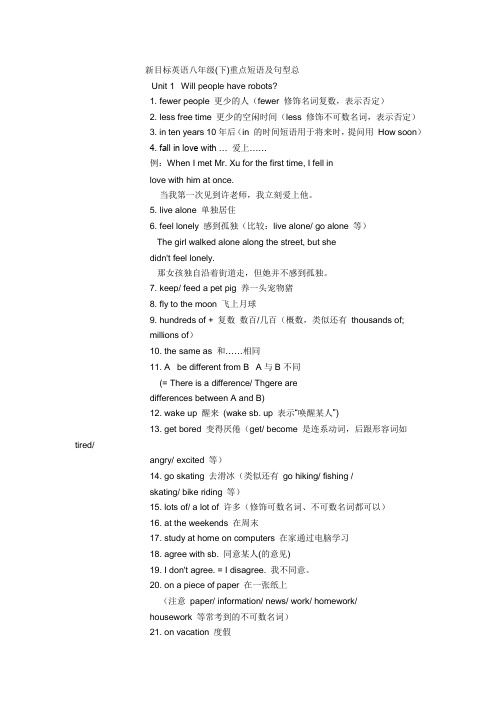
新目标英语八年级(下)重点短语及句型总Unit 1 Will people have robots?1. fewer people 更少的人(fewer 修饰名词复数,表示否定)2. less free time 更少的空闲时间(less 修饰不可数名词,表示否定)3. in ten years 10年后(in 的时间短语用于将来时,提问用How soon)4. fall in love with … 爱上……例:When I met Mr. Xu for the first time, I fell inlove with him at once.当我第一次见到许老师,我立刻爱上他。
5. live alone 单独居住6. feel lonely 感到孤独(比较:live alone/ go alone 等)The girl walked alone along the street, but shedidn't feel lonely.那女孩独自沿着街道走,但她并不感到孤独。
7. keep/ feed a pet pig 养一头宠物猪8. fly to the moon 飞上月球9. hundreds of + 复数数百/几百(概数,类似还有thousands of;millions of)10. the same as 和……相同11. A be different from B A与B不同(= There is a difference/ Thgere aredifferences between A and B)12. wake up 醒来(wake sb. up 表示“唤醒某人”)13. get bored 变得厌倦(get/ become 是连系动词,后跟形容词如tired/angry/ excited 等)14. go skating 去滑冰(类似还有go hiking/ fishing /skating/ bike riding 等)15. lots of/ a lot of 许多(修饰可数名词、不可数名词都可以)16. at the weekends 在周末17. study at home on computers 在家通过电脑学习18. agree with sb. 同意某人(的意见)19. I don't agree. = I disagree. 我不同意。
英语八下人教版重点语法

英语八下人教版重点语法英语学习中,语法是非常重要的一部分。
掌握好语法规则,不仅能够提高学生的语言表达能力,还能够帮助学生更好地理解和应用英语。
下面是英语八下人教版教材中的一些重点语法知识,希望对大家的学习有所帮助。
1. 一般现在时一般现在时是最基础的时态之一,表示经常性的、习惯性的或普遍性的动作或状态。
其构成形式是主语 + 动词原形(单三形式加-s或-es)。
例如:- We play football every Sunday.- He often brushes his teeth after meals.- The sun rises in the east.2. 一般过去时一般过去时用来表示在过去某个时间发生的或者惯常发生的动作或状态,其构成形式是主语 + 动词过去式。
例如:- I went to the park yesterday.- They studied English last night.- She visited her grandparents last summer.3. 一般将来时形式是主语 + will + 动词原形。
例如:- I will go to Beijing next month.- They will have a party on Saturday.- She will buy a new car in the future.4. 现在进行时现在进行时表示此时此刻正在进行的动作,其构成形式是主语 + am/is/are + 现在分词。
例如:- We are watching a movie now.- He is having lunch at the moment.- They are playing games in the park.5. 过去进行时过去进行时表示过去某个时间点正在进行的动作,其构成形式是主语 + was/were + 现在分词。
人教版八年级下册英语——知识点语法归纳总结
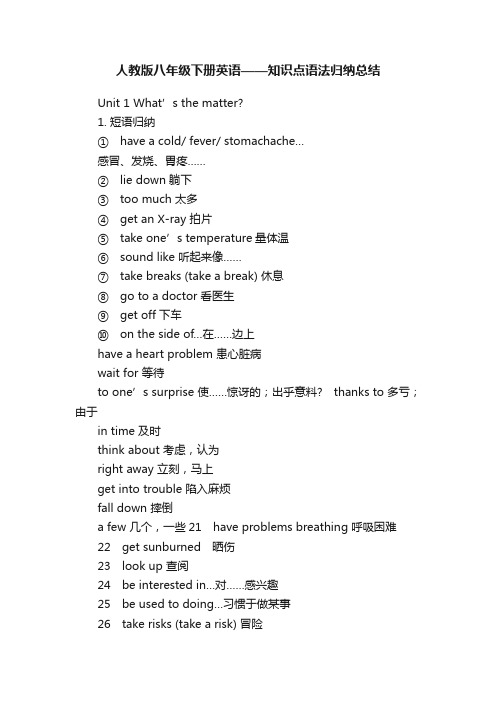
人教版八年级下册英语——知识点语法归纳总结Unit 1 What’s the matter?1. 短语归纳①have a cold/ fever/ stomachache…感冒、发烧、胃疼……②lie down 躺下③too much 太多④get an X-ray 拍片⑤take one’s temperature量体温⑥sound like 听起来像……⑦take breaks (take a break) 休息⑧go to a doctor 看医生⑨get off 下车⑩on the side of…在……边上have a heart problem 患心脏病wait for 等待to one’s surprise 使……惊讶的;出乎意料? thanks to 多亏;由于in time 及时think about 考虑,认为right away 立刻,马上get into trouble 陷入麻烦fall down 摔倒a few 几个,一些21 have problems breathing 呼吸困难22 get sunburned 晒伤23 look up 查阅24 be interested in…对……感兴趣25 be used to doing…习惯于做某事26 take risks (take a risk) 冒险27 lose one’s life 丧生28 became of 因为29 run out (of) 用尽,耗尽30 be ready to do sth. 准备做某事31 cut off 切除32 climb down 爬下33 get out of 离开;从……出来34 tell of 讲述35 the importance of (doing sth.) (做某事的)重要性36 be in control of 掌管,管理37 make a decision 做决定38 keep on doing sth. 坚持做某事39 give up 放弃40 cut/ hurt oneself 使自己受伤2. 典句必背①What’s the matter?②I have a stomachache.③What should I do?④Should I take my temperature?⑤I think you should lie down and rest.⑥If your head and neck still hurt tomorrow, then go to a doctor.⑦His love for mountain climbing is so great that he kept on climbing mountains even after this experience.3. 用法集萃(1) 当别人心情不好,身体不适或遇到麻烦时,我们可以用如下表达表示关心:What’s the matter?What’s the matter with you?What’s wrong with …?What’s the trouble\problem with …?(2) 英语中常用have描述身体的不适,此时have意为“患有”,常用结构:①have a + 疾病例:have a cold 感冒;have a fever 发烧;have a cough 咳嗽②have a + 身体部位-ache例:have a headache 头痛;have a toothache 牙痛③have a sore + 身体部位例:have a sore throat 咽喉痛;have a sore back 背痛(3) lie down躺下;tell lies/a lie 说谎含义过去式过去分词躺;平躺lay lain位于撒谎;说谎lied lied(4) maybe & may be①maybe,“或许”,常用于句首,表示可能性,后加句子。
人教版八年级下册英语重点词汇,短语,句型,语法总结

Unit 1 will people have robots?一、重点词汇:probably;able;interview;company;shape;impossible.二、重点短语:1. be scared of sb./sth. 恐惧某人/某物2. go up 上升,与rise 同义,与go down 或set 相反3. make a noise 发出声响,吵闹4. arrive in 到达,表示到达某一城市、国家等大地方时,用介词in;表示到达某一村庄、车站等小地方时,用介词at ;到达的地方用副词表示时,可不用介词。
5. not…until…直到……才……6. see…doing…停止做某事7. go cycling 相当于go to ride a bike ,意思是去骑车。
8. nit sb. on the head 表示“打某人的头”,表示的“打某人的脸”要用hit sb. in the face 。
9. turn around 转身10. fall off 摔下来11. give sb. a push 推某人一下12. help sb. do sth. = help sb. with sth. 帮助某人做某事13. get off 从……下来,通常指下火车、巴士、轮船、飞机等。
14. think about 思考、想起、想到(某人或某事)15. all day 一整天16. one by one 一个接一个地,类似有year by year 一年又一年;day by day 一天又一天。
17. hold on 有两个意思,一个是“(电话)不挂断”;一个是“抓紧”。
18. come down 下来三、重难点解析:1.比较级:less 最高级least2.agree:1) 表示“同意某人意见”时用agree with sb,该短语不能用于被动语态。
2) 表示“同意(某计划、办法、建议、条件)”时,用agree to(to在此用作介词,其后接名词、代词或者相当于名词的成分),该短语可以用于被动语态。
人教版八年级英语下册全册知识点考点整理

八年级英语下册全册各单元知识点考点整理Unit 1 what's the matter?一、重点短语1.too much太多2.lie down躺下3.get an X-ray做个X光检查4.take one’s temperature量体温5.put some medicine on......在....上敷药6.have a fever发烧7.take breaks/take a break休息8.without thinking twice没多想9.get off下车10.take sb to the hospital送某人去医院11.wait for等待12.to one’s surprise使.......惊讶的13.thanks to多亏于;由于14.in time及时15.think about考虑16.have a heart problem患有心脏病17.get into the trouble遇到麻烦18.do the right thing做正确的事情事情19.fall down摔倒20.put......on sth把...放在某物上21.get hit/sunburned摔伤/烧伤22.be interested in对.....感兴趣23.be used to习惯于....24.take risks/take a risk挑战25.lose one’s life失去生命26.because of因为27.run out of用完28.cut off切除29.get out of从...出来30.make a decision/decisions做决定31.be in control of掌管;管理32.give up放弃主要句型1.It’s+形容词+for sb.+to do sth.做某事对某人来说是…的。
It’s important to do sth.做某事很重要。
人教版八年级英语下册重要语法知识点汇总

人教版八年级英语下册重要语法知识点汇总人教版八年级英语下册重要语法知识点汇总1. 否定句型1) 一般否定句I don't know this. No news is good news.There is no person (smoke)/not a person/not any person (smoke) in the house.2)特指否定He went to his office, not to see him.I am sorry for not coming on time.I don't think/believe/suppose/feel/imagine you are right.3)部分否定All the answers are not right//All is not gold that glittersI don't know all of them.//I can't see everybody/everything.Both of them are not right.4)全体否定None of my friends smoke.//I can see nothing/nobody.Neither of them is right.//Nothing can be so simple as this.5) 延续否定You didn't see him, neither/nor did I.You don't know, I don't know either.He doesn't know English, let alone/to say nothing of/not to speak of (更不用说) French.6) 半否定句We seldom/hardly/scarcely/barely hear such fine singing.I know little English. I saw few people.7) 双重否定You can't make something out of nothing.//What's done cannot be undone. There is no sweet without sweat.//No gain without pains.I can't help /keep/ laughing whenever I hear it.No man is so old but (that) he can learn.8)排除否定Everyone is ready except you.//He did nothing but play.But for your help, I couldn't do it.9)加强否定I won't do it at all.//I can't see it any more.//He is no longer a boy.2. 判断句型1) 一般判断句It is important for us to learn English.It is kind of you to help me sincere means honest.The boy is called/named Tom.We regarded/consider it as an honor.2)强调判断It is English that we should learn.//It is he who helped me a lot.3)弱式判断Your sentence doesn't sound/look/appear/feel right.You look/seem as if/as thought you had been there before.Maybe/Perhaps/ she is ill.He is probably ill.//He is likely ill. //It is possible that he is late 4) 注释判断He can remember so many English words, that is (to say) he is a living dictionary.(活字典)5) 正反判断That sounds all right, but in fact it is not.6) 比较判断It is more a picture than a poem.7) 互斥判断He or you are wrong. Either he is right or I am.3. 祝愿祁使句式1) 一般句式Study hard and keep fit. Be brave! Don't be shy! Get out of here.2)强语式Do tell me. Never tell a lie.3) 委婉祈使句Please tell me the true. Would/Will/Won't do me a favor?Would/Do you mind my smoking? What/How/ about going on foot?4)建议祈使句Let us go. Let us know the time. Don't let the fire out.Let's not waste the time. You'd better start early.Shall we listen to some music? Why don't you get something to drink? Suppose/supposing you pick me up at about six?I suggest we (should) take the train.5)祝愿句Success to you! //Wish you a good journey.May you have a happy marriage. //Here's to your success!Allow me to propose a toast to our friendship!4. 感叹句型How well he speaks! //How kind she is! //What a nice weather it is! Here he comes! //Such is life! //Wonderful! // Help!5. 疑问句型1) 一般疑问句Is he a doctor?//Do you the way to the station?2)反意疑问句He is a teacher, isn't he?//It is quite cheap, don't you think?3) 特殊疑问句What is the distance/width/size/population/temperature/fare?Who is he? What is he?(干什么的)//What is he like? // How is he? How do you like him? //What do you think of him?What ever do you mean by saying this?4)选择疑问句He is a doctor or a nurse?5)间接疑问句Do you know how old he is? //Tell me if (whether) you like it.What do you think/say/suppose I should do?6. 数词句型1) 表数目It is exactly ten o'clock.//It is five miles away from here.He is more than/over/ at least not less than 20.He is under/at most/no more than 20.2)表年月日He was born on April 22 1994/in 1994 on the morning of Oct.1.3)表年龄He is 20 years old/years of age.//He is at the age of 10.4)表倍数It is four times that of last years.This is four times as big (again) as that one.This is four times bigger than that one.The income is double what it was.The output of coal was 200% greater than in 1998.5)表计量It is 10 meters long/wide/high.//It costs me 100 yuan.I spent 10 hours to finish it.//It took me 10 days to finish it.It is worth 100 yuan.7. 关联指代句型1)两项关连I have two books, one is Chinese; the other English.I have five books, one is Chinese; the others English.To say is one thing, but/and/ to do is another.One the one hand, I am your teacher, and on the other hand, I am also you friend.Some like to play football, others are fond of basketball.2)先后顺序First/firstly, I wish good health, second/secondly success in your study, third/thirdly good luck in everything.First stop, then look, finally cross.At first/in the beginning/ he word hard. Later/Afterwards he is not so diligent.3)修饰限制This is the same book as I lost yesterday.This is the same book that I lost yesterday.(同一本书)Don't trust such a man as over praise you.He/One/Those/They who should come failed to appear.A man/A person/The one/Anyone/People who saw her liked her very much.The day/time/moment will come when China is strongest in the world.4) 两项连接He can speak not only English but also French.The book is both interesting and instructive.It is neither cold nor hot.Please either come in or go out.The old worker has experience and knowledge as well.5)加和关系Besides literature, we have grammar and writing.Apart from oxygen, there are some other gases in the air.In addition to "if", there is many other conjunctions that can introduce conditional clauses.I must go now, incidentally, if you want that book.You seem to like tea, so do I.8. 比较句型1)等比句He is as tall as I. // He is the same height as I.She is no less diligent than he. The lab is no better than a cottage.2) 差比句I speak English worse than he does.//He is not so/as tall as I am.Our knowledge is much inferior to their.3) 极比句He is the tallest of all in the class.None/No one/ is so blind as those that won't see.Nothing is so easy as this.4)比例句The more a man knows, the more he feels his ignorance(无知).5) 择比句He is taller than any other boy in the classIt is better late than never.//They would die than live as slavesHe prefers doing to talking//He prefers to do rather than to talk.He prefers mathematics to English.//I'd rather stay here.6)对比句You think me idle, but on the contrary, I am busy.They are working hard while you are wasting your time.9. 比喻句型We must work like him.//He behaves as his father does.He speaks English as if/though he was a foreigner.10. 条件假设句1) 一般事实If we succeed, what will the people say?Suppose it rains, what shall we do?Persevere(坚持) and you'll succeed.2)虚拟条件句If I were you, I would go.//If you had seen it, you would have been moved.3)反条件句Unless you try, you'll never succeed.//Don't move, or/else/otherwise I'll shot.4)唯一条件句If only I have another chance, I shall do better.Only in this way can we learn English well.So/As long as we don't lose heart, we'll succeed.5)推论条件句Since that is so, there is no more to say.Now that you are grown up, you must stop this behavior.11. 时间句型1)一般时When I see him, I'll tell him.2) 表同时You'll grow wiser as you grow older.Work while you work, play while you play.He worked, at the same/in the meantime he listened to the music.3)限制时Every/each time when I went to his house, he was out.By the time that we got there, he was out.4)交替时Sometimes he sings, sometimes he dances.At one time the baby cries, at another it talks.5)先时I stopped hem before he began to talk with me.6)后时I'll tell you after I finish it.7)紧接时As soon as I see him, I'll tell him.Once you begin, you must continue.The (very) moment/instant (that) I saw him, I recognized him. On hearing the news, she bust into tears.Hardly had I seen the light, when I heard a loud thundering.8)延续时I haven't seen him since I came here.A friend is never know till/until a man have need.12. 地点句型1) 一般地点Where have you been?Where there is a will, there is a way.2)方位Hebei lies in the east of China.Japan is lies to the east of China.The house faces (to) the south.He is sitting at the front of the classroomHe is standing in front of/before me.He is sitting at the back of/behind me.He is sitting in the back of/at the rear of the classroom. He is sitting next to/besides me.He is sitting close to/near me.At the top of/On top of the shelf, there are some books.He is sitting on the left/right.The mountain you see to the right is the Purple Mountain. 13. 原因句型He didn't go to school because he was ill.Since we are all here, let's begin our meeting.It might rain yesterday, for the ground was wet.Now (that) we have finished the work, we can go home.I am glad to meet you.I am sorry that I hear that.Thank you for your help.That is why he failed to come.He didn't come because of/on account of the weather.He went out of curiosity.I succeeded thanks to his help.This failure is due to the fact they lack experience.Owing to our joint efforts, the task was fulfilled.What are studying English for?For what reason did you choose this?What's the point of asking his to do that?How come you never told me about it?What with the wind and what with the rain, our walk was spoiled.14. 目的句型He stopped aside so that she could go in.He sits in the front in order that he can see words clearly.He gets up early so as to/in order to have time to do exercises. He repeated it for fear that there should be any mistake.15. 结果句型It was very cold, so that the river froze.They cost a lot of money, so/therefore we use them carefully. He is such a good man that every one likes him.He ran so fast that no one could catch him.He hurried to the house only to find that it was empty.I was caught in the rain. As a result, I had a bad cold.16. 程度句型How often do you write to your parents?How long do you stay at home?It is so beautiful that we all love it.It is too big for you.He is too excited to speak.He is not old enough to know this.The letter must be sent as soon as possibleYou must work as hard as you can.As far as I know, I can speak only English.17. 让步句型Though/Although he is rich, (yet/still) he doesn't show off.Yang as he is, he know a lot of things.Even if/though he succeeded, he was not proud.No matter what you say, I'll still try to do it.Keep calm, whatever happens.In spite of this, we must go ahead with our plans.Regardless of all the difficulties, we'll fight it out to the end.18. 转折句型I searched everywhere but could not find him.You may go, only return quickly.He is seriously ill, still there is hope of his recovery.It looked like rain, however it was clear in the afternoon.He is still young, yet he is high up in the position.He didn't tell me the truth, I know it, though.19. 省略句I think/say/suppose/expect/believe/hope so.Why not come earlier next time?。
人教版英语八年级下册知识点总结

八年级英语下册语法知识复习1.should 情态动词,应该,应当,用于询问,提出建议,或表达职责和义务。
如:What should I do? You should have a talk with your parents。
could 也可以提出建议,比较委婉.如: You could write him a letter。
could还用于礼貌地请求,如:Could you please clean your room? 否定句式:Could you please not do sth?其他常用情态动词:must必须,have to必须,不得不,may可能,可以,can能,会,可能,可以need需要。
情态动词+动词原形作谓语。
2.非谓语动词形式(一)动词不定式结构:to+动词原形或不带to。
否定:not+to do或not do句法功能:1)主语:常用it作形式主语,不定式为真正的主语:It is +形容词+for sb。
to do sth.It is important to keep fit。
=To keep fit is important.2)宾语:(1)直接宾语:想,喜欢,希望:want,like, love,would like,hope, expect;决定同意拒绝开始学习:decide,agree, refuse, begin,start, learn, 需要计划帮助提供:need, plan,help,offer+ to do(划线的动词还可以接doing)如:I’ll help to clean up the city parks。
(宾语)疑问词(what, who, which,where, when ,how,)+to do 作宾语I don’t know what to say. 我不知道说什么。
(2)宾补:tell,ask,want,wish,allow,invite,help,encourage,teach等+ sb. to do (hope不能接sb。
人教版八年级英语下册语法归纳

八年级下册重点语法和短语Unit 1 Will people have robots?重点语法:一般将来时态的应用do/does 的一般将来时态形式:(shall/will) dodo/does 的一般将来时态的被动语态:(shall/will) be done一般将来时态的肯定句、否定句、疑问句形式:肯定句例句:People will have robots in a few years.否定句例句:People (will not/won't) have robots in a few years.一般疑问句例句:Will people have robots in a few years?特殊疑问句例句:What will people have in a few years?重点短语:won't = will notthey'll = they willshe'll = she willhe'll = he willI'll = I willfall in love with(sb./sth.) 爱上(某人/某物)be able to do sth. 能够做某事come true 实现in the future 未来hundreds of 数以百计的thousands of 数以千计的look for(sb./sth.) 寻找(某人/某物)will → would 情态动词will 的原形和过去式may → might 情态动词may 的原形和过去式Reading Strategy(阅读方法)Look at the title and picture, and predict what you will read about. (看着标题和图片,预知你要阅读那些方面的内容。
)This helps you get ready to acquire new information. (这样可以帮助你获得一些新的信息。
初中英语人教版八年级下册重点语法知识归纳(共十二类)

八年级英语下册重点语法点归纳1.形容词/副词的比较级和最高级1.形容词/副词的比较级和最高级的构成规则(1)单音节词和少数以-er,-ow结尾的双音节单词,比较级在后面加-er,最高级在后面加-est。
①单音节单词small→smaller→smallestshort→shorter→shortesttall→taller→tallestgreat→greater→greatest②少数以-er,-ow结尾的双音节单词clever→cleverer→cleverestnarrow→narrower→narrowest(2)以不发音e结尾的单音节单词,比较级在原形后加-r,最高级在原级后加-st。
large→larger→largestnice→nicer→nicestable→abler→ablest(3)以一个辅音字母结尾的闭音节(即:辅音+元音+辅音)单词中,先双写末尾的辅音字母,比较级加-er,最高级加-est。
big→bigger→biggesthot→hotter→hottestfat→fatter→fattest(4)以“辅音字母+y”结尾的双音节词,把y改为i,比较级加-er,最高级加-est。
easy→easier→easiestheavy→heavier→heaviestbusy→busier→busiesthappy→happier→happiest(5)其他双音节词和多音节词,比较级在前面加more,最高级在前面加most。
beautiful→more beautiful→most beautifuldifferent→more different→most differenteasily→more easily→most easily(6)有少数形容词、副词的比较级和最高级是不规则的,必须熟记。
good→better→bestwell→better→bestbad→worse→worstill→worse→worstold→older/elder→oldest/eldestmany/much→more→mostlittle→less→leastfar →further/farther→ furthest/farthest2.形容词和副词比较级的用法(1)“甲+be+(倍数)+形容词比较级+than+乙”表示“甲比乙…”或“甲比乙…几倍”。
最全人教版英语初二八年级下册语法知识大全

八年级下学期语法知识大汇总一. 如何询问健康问题1. 询问某人患了何种疾病或遇到了何种麻烦时,常用以下几种结构来表达:What‟s the matter (with sb.)?(某人)怎么了?What‟s wrong (with sb.)?(某人)怎么了?What‟s the trouble with sb? 某人出什么事了?What happened to sb? 某人发生了什么事?Are you OK? 你没事吧?Is there anything wrong with sb.?某人有不舒服/麻烦吗?2. 要表达身体疼痛或不舒服,可用以下结构:①某人+have/has+病症The twins have colds.双胞胎感冒了。
②某人+have/has+a+headache/toothache/stomachache/backache/earache.She had a stomachache last night. 她昨晚肚子痛。
③某人+have/has+a+sore+发病部位He has a sore throat. 他喉咙痛。
④某人+hurt(s)+身体部位或反身代词He hurt his leg. 他的腿受伤了。
⑤某部位+hurt(s).My head hurts badly. 我头痛得厉害。
⑥某人+have/has+a pain+in one‟s+身体部位I have a pain in my chest. 我胸口痛。
⑦(There is) something wrong with one‟s+身体部位There is something wrong with my right eye. 我的右眼有毛病。
⑧其他表达方式She has a heart trouble. 她有心脏病。
He got hit on the head. 他头部受到了撞击。
She cut her finger. 她割破手指了。
人教版初中英语八年级下册语法知识点
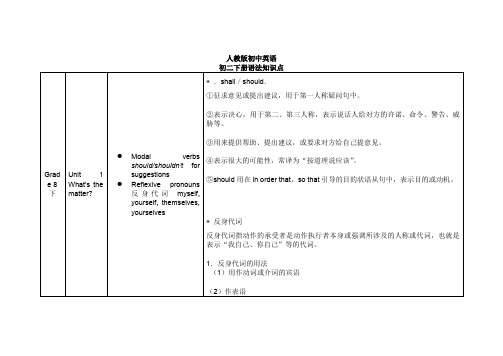
4.动词+副词+介词(其后需加宾语)
5.动词+名词(其后不加宾语)
make a bed整理床铺take place发生make faces做鬼脸
6.动词+名词+介词(其后需加宾语)
It is very kind of you to help me.=You are very kind to help me.你帮我的忙,太谢谢你了。
5.疑问词和不定式连用和疑问词连用的不定式在句中相当于名词,常作主语、宾语、表语、同位语等。
6.省略to的不定式
(1)当两个(或两个以上的)不定式由and,or,than等连接时,通常只需在第一个不定式前用to,其余不定式前的to可省略。
4)当某些结构后的不定式动作与句中某一动作重复时,不定式符号to之后的其他成分可以省略,只保留不定式符号to。常见结构有:be able to,be going to,have to,ought to,used to等。
8.不定式的主动表示被动
①在“be+性质形容词+不定式”结构中。
此类形容词有easy,hard,difficult,interesting,heavy,pleasant,comfortable,safe,dangerous,impossible等。
4.不定式的复合结构不定式用for和of引出逻辑主语,带有逻辑主语的不定式称为不定式的复合结构。不定式的复合结构在句中可作主语、宾语、定语等。
当作表语的形容词表示人的性格、品质时,常用of引出不定式的逻辑主语,否则用for引出。常见的表示性格、品质的形容词有:
good好的kind和蔼的brave勇敢的honest诚实的lazy懒惰的nice好的wise明智的clever聪明的silly傻的stupid笨的foolish愚蠢的right正确的wrong错的rude粗鲁的polite礼貌的fair公正的unfair不公正的careless粗心的careful细心的patient耐心的
- 1、下载文档前请自行甄别文档内容的完整性,平台不提供额外的编辑、内容补充、找答案等附加服务。
- 2、"仅部分预览"的文档,不可在线预览部分如存在完整性等问题,可反馈申请退款(可完整预览的文档不适用该条件!)。
- 3、如文档侵犯您的权益,请联系客服反馈,我们会尽快为您处理(人工客服工作时间:9:00-18:30)。
人教版|八年级下册英语重点语法知识全汇总
重点语法:一般将来时态的应用
do/does 的一般将来时态形式:(shall/will) do
do/does 的一般将来时态的被动语态:(shall/will) be done
一般将来时态的肯定句、否定句、疑问句形式:
肯定句例句:People will have robots in a few years.
否定句例句:People (will not/won't) have robots in a few years.
一般疑问句例句:Will people have robots in a few years?
特殊疑问句例句:What will people have in a few years?
重点语法:过去将来时
一、过去将来时的结构
should/would+动词原形
do/does 的过去将来时态形式:(should/would) do
do/does的过去将来时态的被动语态:(should/would) be done
过去将来时态的肯定句、否定句、疑问句形式:
肯定句例句:You should write a letter to him.
否定句例句:You shouldn't write a letter to him.
一般疑问句例句:Should I write a letter to him?
特殊疑问句例句:What should I do?
重点语法:过去进行时
do/does 的过去进行时态形式:(was/were) doing
do/does 的过去进行时态的被动语态:(was/were) being done
过去将来时态的肯定句、否定句和疑问句形式:
肯定句例句:I was walking down the street when a UFO landed.
否定句例句:I wasn't walking down the street when a UFO landed.
一般疑问句例句:Were you walking down the street when a UFO landed? 特殊疑问句例句:What were you doing when a UFO landed?
动词when 和while 的选择:when 后加瞬间动词,while 后加延续性动词。
例句:The boy was walking down the street when the UFO landed.
=While the boy was walking down the street, the UFO landed.
重点语法:宾语从句
结构:主语+ 谓语动词+ 宾语从句(主语+ 谓语动词+ 宾语/表语)
1、引导名词性从句的连接词
(1)that:没有含义,在宾语从句中不做成分
(2)whether/if:表示是否,宾语从句中不做成分。
I don't know if /whether he still lives here after so many years. 我不知道这么多年后,他是否还住在这里。
(3)连接代词:what, which, who, whom, whose(在宾语从句中做主、宾、表和定语)
连接副词:where, when, how, why(在宾语从句中做状语)
2、在做宾语从句的题目时应注意时态
(1)当主句是现在时态时,宾语从句可以根据需要使用任何时态。
He tells me that his sister came back yesterday.他告诉我他姐姐昨天回来了。
(2)当主句是过去时态时,宾语从句必须是一种过去的时态。
She asked me if I knew whose pen it was.她问我是否知道这是谁的钢笔。
(3)当表示客观事实或普遍真理的句子做宾语从句时,任何时候都用一般现在时。
The teacher said that the earth goes round the sun.老师说过地球绕着太阳转。
重点语法:if 引导的条件状语从句
结构:主句+ if + 条件状语从句
if + 条件状语从句+ [(comma)] + 主句
注意:
在if 引导的条件状语从句中,主句应用将来时态,状语从句用一般现在时态。
例句:You'll have a great time if you go to the party.
=If you go to the party, you'll have a great time.
重点语法:现在完成进行时态
do/does 的现在完成进行时态形式:have/has been doing
do/does 的现在完成进行时态的被动语态:have/has been being done
现在完成进行时态所应用的场合:
①某事从过去发生一直持续到现在都在做
②过去发生的动作对现在造成影响
I have been making progress since he talked with me that time.自从那次他与我谈过心后,我天天都在进步。
现在完成进行时态的肯定句、否定句和疑问句形式:
肯定句例句:I have been skating for five hours.
否定句例句:I haven't been skating for five hours.
一般疑问句例句:Have you been skating for five hours?
特殊疑问句例句:How long have you been skating?
重点语法:现在完成时
一、现在完成时的结构
主语+ have/has + 过去分词+ 其他.(当主语是第三人称单数时用has,其余人称用have.)
否定式:主语+ haven't/hasn't + 过去分词+ 其他.
疑问式: Have /Has + 主语+ 过去分词+ 其他?
简略答语: Yes, 主语+ have/has.(肯定)
No, 主语+ haven't/hasn't.(否定)
二、现在完成时用法、定义详细讲解
1、表示过去所发生的动作或事情对现在的影响或产生的结果,着眼点在现在,主要强调过去发生的事情对现在的影响。
He has lost his wallet.他的钱包丢了。
We’ve had too much rain this year.今年雨水太多。
2、表示一个从过去某个时间开始,延续到现在,并可能延续下去的动作。
He has worked here for over twenty years.他在这里工作已有20多年了。
3、表示说话前发生过一次或多次的动作,现在成为一种经验,一般译为汉语“过”,常带有twice, ever, never, three times等时间状语。
I have been to Beijing twice.我去过北京两次。
重点语法:反意疑问句
反意疑问句由肯定陈述句加否定问句构成,或者由否定陈述句加肯定问句构成。
He's a student, isn't he?
She's not his mother, is she?
回答反意疑问句时,要根据事实来回答。
若事实是肯定的,则必须用yes 回答。
若事实是否定的,则必须用no 回答。
---You're not ready, are you?你还没有准备好,对吧?---No, I'm not.是的,我没有准备好。
---Yes, I am.不,我准备好了。
